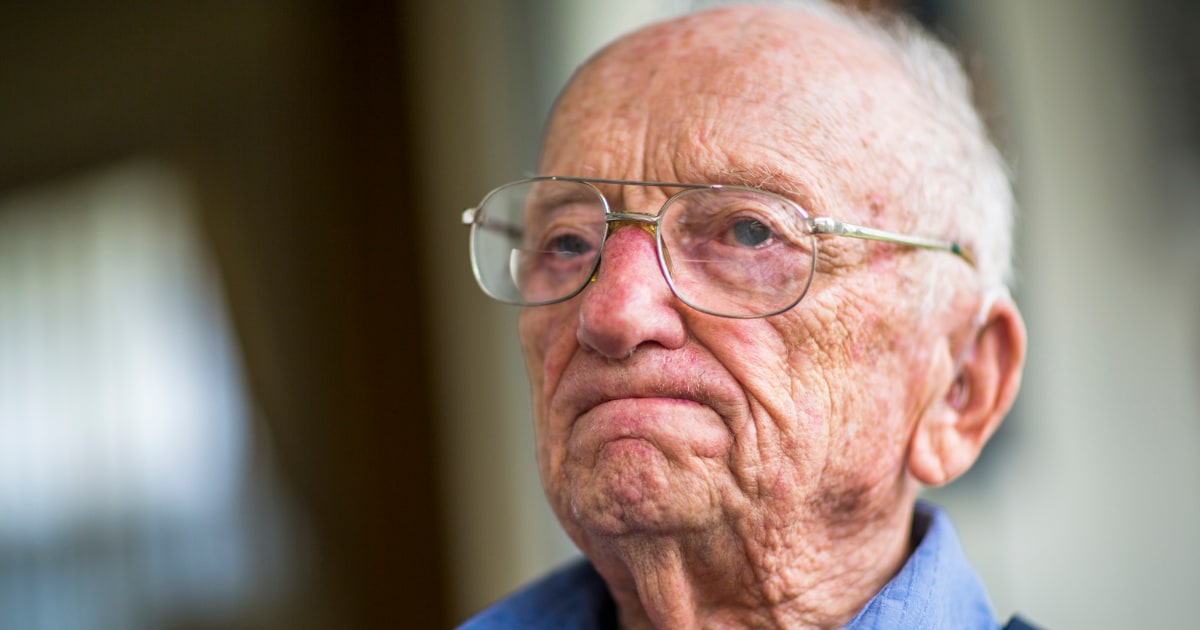
www.nbcnews.com
‘A treasure of humanity’: 102-year-old Nazi prosecutor is still pushing for peace
With the number of Holocaust survivors dwindling around the world, Ben Ferencz represents a link to one of the darkest chapters in history.
Culture & Entertainment
Ben Ferencz, the last surviving prosecutor from the Nuremberg trials, answered the phone in bright spirits. “Good morning,” he hollered. “Ask your questions.”
Nearly 75 years had passed since Ferencz secured convictions against 22 Nazi death squad commanders responsible for the murder of more than 1 million Jews and others. The trials marked the first time in history that mass murderers were prosecuted for war crimes, and Ferencz was only 27 at the time. He went on to play a crucial role in securing compensation for Holocaust survivors and in the creation of the International Criminal Court at The Hague.
Now he was sitting at his desk in Delray Beach, Florida, a 102-year-old man answering a reporter’s questions with wit and remarkable recall.
What were his final words to the lead defendant after a judge sentenced the man to death in 1948? “Goodbye, Mr. Ohlendorf.”
What did he think about the war in Ukraine and the uptick in antisemitic incidents around the globe? “The world has still not learned the lessons of Nuremberg.”
What was his secret to living such a long life? “Luck!”
But not long after that interview in November, Ferencz’s health took a turn for the worse.
His cheeks became more hollow. His thoughts grew more confused. He stopped checking his emails.
“He declined very rapidly,” his son, Don, said last week. “But he is still in good spirits, still has his sense of humor and, when not too tired, is still perfectly cogent and well-reasoning.”
With the number of Holocaust survivors dwindling around the world, Ben Ferencz represents a link to one of the darkest chapters in history. Before his health deteriorated, he reflected on his extraordinary life in a 45-minute interview with NBC News.
‘Grim as hell’
What was described as “the biggest murder trial in history” was in fact Ferencz’s first case ever.
The son of Hungarian Jews, he was 10 months old when his family immigrated to the U.S. in 1920 and settled in New York City. He grew up poor on the rough and tumble streets of Hell’s Kitchen where his father worked as a janitor-turned-house painter.
Ferencz attended the City College of New York, which was free for bright immigrants, earned a scholarship to Harvard Law School and enlisted in the Army after graduation as World War II engulfed Europe.
He landed on the beaches of Normandy and fought in the Battle of the Bulge. With the allied forces closing in on the center of Nazi power in Berlin, he was transferred to a unit responsible for gathering evidence of war crimes.
Ferencz traveled to multiple concentration camps — Buchenwald, Mauthause, Flossenburg, Ebensee — often within days and sometimes hours of their liberation. The scenes he witnessed would haunt him for the rest of his life.
Skeletal figures with hollow eyes pleading for help — many too weak or too sick to move. Others crawling around garbage piles, digging for scraps of food.
And bodies. So many dead bodies — in some cases stacked like firewood in front of the still-burning crematoriums.
“Grim as hell,” Ferencz said. “I had to refrain from letting it get to me emotionally.”
He had a specific job to do. The Nazis were well known for keeping detailed records. Ferencz was tasked with securing them before they were destroyed.
“My goal was clear: grab the documents,” he recalled. “I headed straight to the main office and closed it off. ‘Nobody goes in or out without my permission. No German, no American — nobody. I want complete control of the archives,’ which I got.”
Ferencz said it took immense effort to keep his emotions in check.
“I knew that what I was seeing was horror,” he said.
He told himself: “Just get on with the job, Benny. Just get your evidence. And get your ass out of there.”
Ferencz and his men collected thousands of documents at the camps and facilities in Berlin. They included detailed reports on the Einsatzgruppen, special SS units that roamed Nazi-occupied Europe and killed more than 1 million people.
The Nazis’ studious bookkeeping would soon seal the fate of some of Hitler’s most infamous henchmen.
‘A hot potato’
The first and best-known trial in Nuremberg kicked off in November 1945. It ended with the conviction of Herman Goring and 21 other top Nazi lieutenants.
The U.S. decided to hold 12 more trials in Nuremberg against Nazi judges, doctors and other top figures.
By the time Ferencz found the Einsatzgruppen records, the U.S. had already finalized plans for the other trials.
“I knew I had a hot potato,” he said.
He flew to Nuremberg and told Telford Taylor, the chief counsel for the prosecutions, that they must add another trial. But Telford said it wasn’t possible. The budget had already been set and the Pentagon wasn’t keen on any more trials.
“I got a little bit indignant,” Ferencz recalled. “I said, ‘I have in my hand here the mass murder of a million people. Don’t tell me we can’t put them on trial.’
“He said, ‘Well, can you do it in addition to your other work?’
I said, ‘Sure.’ That’s how I got my first case.”
The trial began on Sept. 29, 1947. The defendants were imposing figures — middle-aged men who had overseen the mass slaughter of innocent civilians. Ferencz was six months shy of his 28th birthday and barely stood 5 feet tall.
He was so short he had to stand on books to reach the courtroom lectern. But he spoke with the power and eloquence of a seasoned litigator.
























































